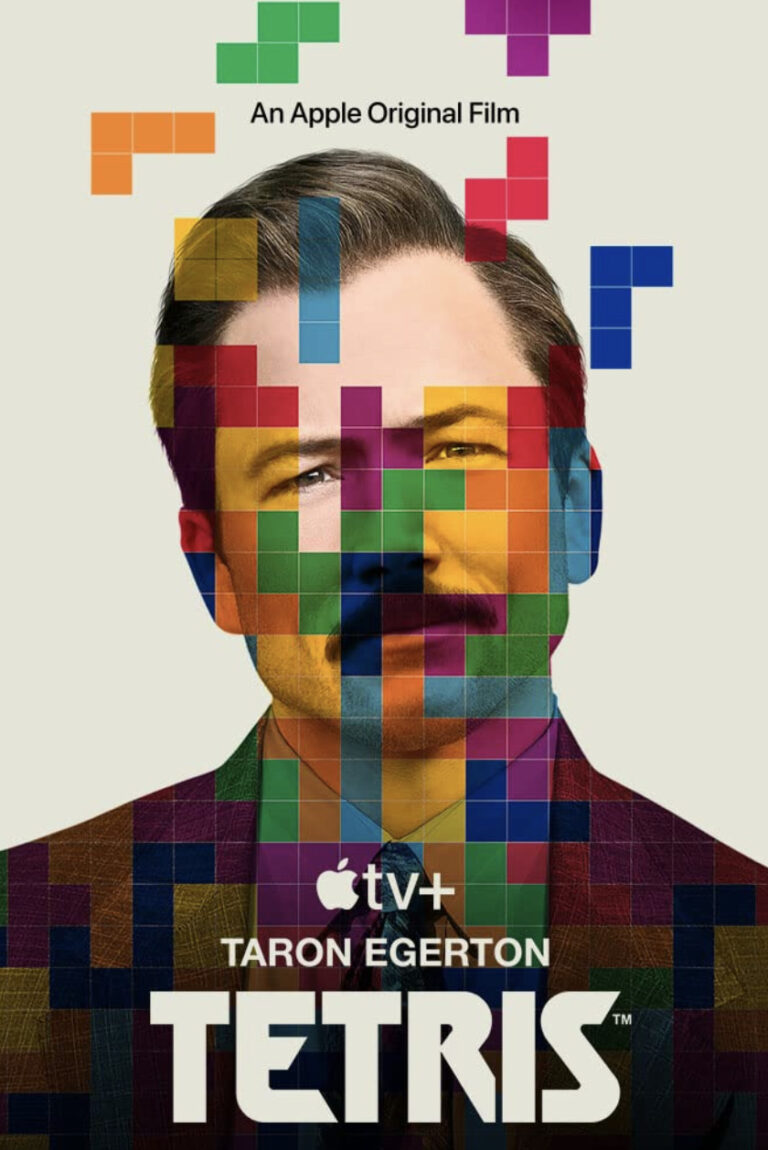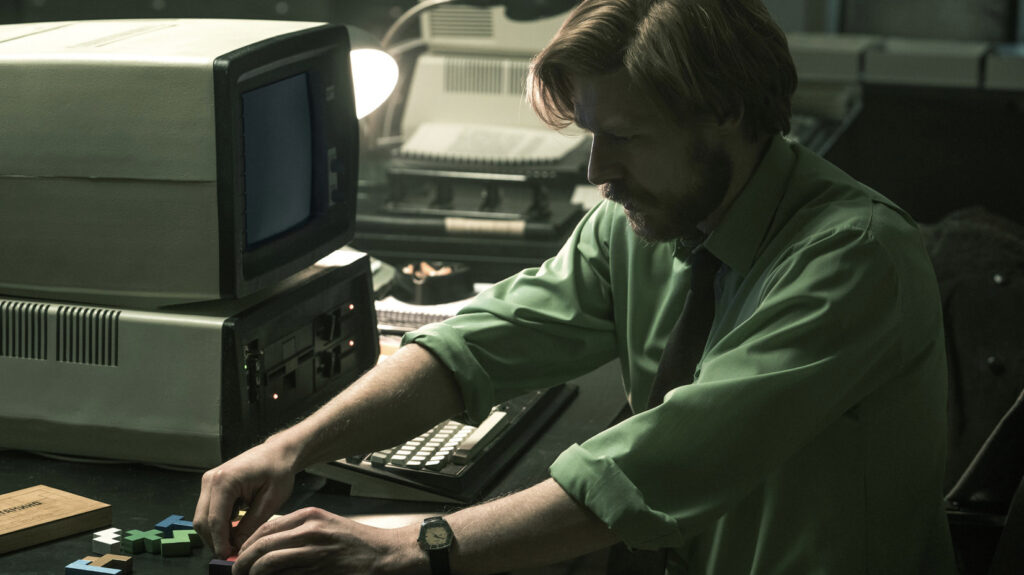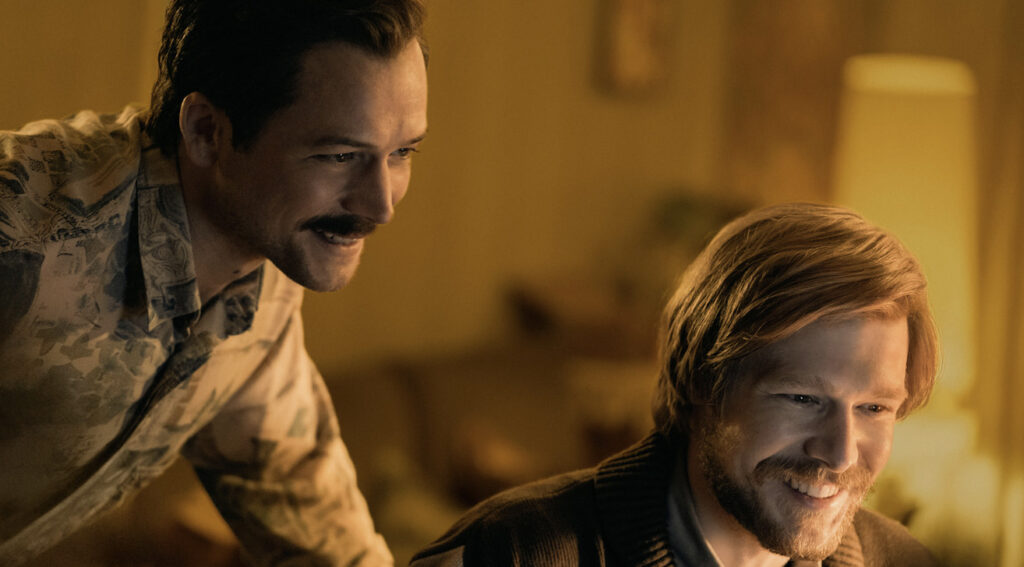
Synopsis : “Tetris” tells the unbelievable story of how one of the world’s most popular video games found its way to avid players around the globe. Henk Rogers (Taron Egerton) discovers TETRIS in 1988, and then risks everything by traveling to the Soviet Union, where he joins forces with inventor Alexey Pazhitnov (Nikita Efremov) to bring the game to the masses. Based on a true story, “Tetris” is a Cold War-era thriller on steroids, with double-crossing villains, unlikely heroes and a nail-biting race to the finish.
- Rating: R (Language)
- Genre: Mystery & thriller, Biography, Drama
- Original Language: English
- Director: Jon S. Baird
- Producer: Gillian Berrie, Len Blavatnik, Gregor Cameron, Claudia Schiffer, Matthew Vaugn
- Writer: Noah
- Release Date (Theaters): Limited
- Release Date (Streaming):
- Runtime:
- Distributor: Apple TV+

Interview with a Creator of Tetris, Alexey Pajitnov and a Game Designer/Entrepreneur Henk Rogers
Q: Henk, in the film we see you go literally behind the Iron Curtain without any paperwork, which sounds mad, brilliantly mad. Was that the reality of how that played out for real? What was that like to [actually] deal with all those bureaucrats when you [didn’t have] the right paperwork or anything?
HR: Yeah, that’s exactly what happened. I made my decision to go, and then went to the Soviet embassy at the time [1989] to get a visa. Two days later I was on a plane with a tourist visa, so I didn’t know who I was going to meet. I just went for it.
After a couple of days, I figured out that they were not that competent. But I didn’t know whether I was going to end up in a gulag, or whether they were even going to let me in. In the beginning, they said “You’re Danish” — they had made that mistake (and they kept it in the movie). I said “No, I’m not Danish, I’m Dutch.” [They said] “But it says you’re Danish.” It’s like, so what’s going to happen now? Are they going to send me back? It was just that weird. I said “You guys must have made a mistake. I can’t read Cyrillic.”
So I don’t know what it says. It was exciting, and I looked at it as an adventure game. That’s the way I look back at it. I could have taken a wrong turn anywhere and fallen into the “Pit of Lava”. [laughter]
Q: Going into this, did either of you have any reservations or concerns, and if so, how did you address those with Jon [S. Baird, director], Taron [Egerton, who plays Rogers] or anybody else involved?
AP: Well, my main problem was that it was very much Hollywood-style stuff, like a real[-life] action movie. Hopefully, it becomes a really good thriller on steroids, which is much more similar to what we had in reality.
HR: My concern always was that the adventure, the first ten days in Moscow, was an amazingly exciting, impossible-mission kind of thing, and I didn’t want that to be lost in the Hollywood-ness of the movie. And it didn’t. It was actually captured very well. That was what worried me the most. It was a great story, I hoped somebody [wouldn’t] screw it up, and they totally didn’t. So I’m thrilled.
Q: Thanks to this film, many more people will learn about your history and the effort and risk that it took to bring “Tetris” to Game Boy. Looking to the past, how do you feel when you remember that odyssey that changed your lives?
HR: I look back at it as the greatest adventure that I’ve ever lived through. I was there by myself, I didn’t know anybody, and I was just trying to find my way to people that would actually be my friends so that I could get through it. It turned out that Alexey became my friend. Of all the people that I tried to find in Moscow, it was Alexey that became my friend. He was helping me to figure things out, because I didn’t know — I was a fish out of water. I’d never been to a Communist country before, I’d never been behind the Iron Curtain before. I didn’t know what I was doing, and that part of it was really exciting.
AP: For me, I’m still taking care of my video game “Tetris”. It’s great [that] this movie captured the most important [thing]: the peak of my life in the game. That was done very accurately and in a very exciting way. That was great.

Q: Were you on set, and how were you involved in the production?
HR: Yes, we were on set in London, and we do have cameos. But where they are in the movie is classified. We’ll have to wait for someone to discover us. How we were involved is, we went through the script. The two of us sat together and went over the script, hours and hours we went through the script. Where we could make things more realistic, then we did: how the KGB is portrayed, the rooms, all these things. We worked on making sure that it was as true to life as it could possibly be.
AP: Yes, our main role was to work on the script. I feel proud for my friend and for myself that we really bring that through. The movie is incredibly truthful in spirit. That’s our main achievement.
Q: How much did you guys actually change the game of “Tetris” from initial creation to actually selling the product?
HR: Yes, the original game was like an endless game, and it got faster and faster and faster. But at the time, other games like “Space Invaders” or “PacMan”, had levels. I was a publisher in Japan, and I was thinking, how do people know how much they’re scoring when they do something? So I wanted to make it clear that after each level it gives you how many singles, how many doubles, how many triples, and how many tetrises — where you clear four lines — at a time. I came up with the concept of single-double-triple-tetris — like single-double-triple-home run. Tetris is the biggest that you can do in “Tetris”, you clear four lines at a time.
I’m a game designer myself. I worked on “Tetris” quite a bit, and I think I made some contribution to its design.
AP: You did. That’s pretty much the matter of the platform. I designed my game for the computer, I had in mind just the computer. I never even saw any video platform or any hand-held device in my life. That’s why the original “Tetris” was designed specifically for the computer platform. The video platform needed to be adjusted, and Henk’s proposals were very appropriate for that particular platform.
Q: Do either of you know CTWC, Classic Tetris World Championship, because they invented a new trick to play the game so the player can reach Level 29 very easily.
HR: Yes, yes, you’re talking about the NES version, and they found a new way of playing. I think it’s fascinating. It’s great — level 29, ohmygosh. The fact that they’re still playing on the original NES is amazing. Once in a while a game comes along and you keep your old hardware just so you can play that game.
I think “Tetris” is the reason why people still have Game Boys and they still have the NES. It’s a testament to how long the life of that game is, and the fact that it’s [still] so vibrant.
AP: I’m still photographing several “Tetris” cartridges people bring to me and ask for signing [my autograph].
HR: That happened to me yesterday, the first time. I got off the plane, and in the baggage there were people: “Can you sign this?” I got two NES cartridges to sign.

Q: This film shows the Soviet people in the beginning as cold. Do you think that’s a symbolic representation, or is it portrayed as you lived it?
HR: You’re asking whether the people in the Soviet Union were actually that cold? Yeah, that was my impression when I first got there. Normally, when I go to a new country, I try to charm the people at the airport, charm the people at the hotel, and be friendly to them so that I can get a smile.
[In the Soviet] I didn’t get a smile out of anybody. That was a very strange place. Why is nobody smiling back? Why is nobody reacting to anything that I normally do? That’s just the way it was. So they captured that in the movie.
AP: Well, I don’t know. I grew up in this country [Russia] and never visited another one before. Basically, at that time, I felt that the Russians were very hospitable because you can’t really enter our city. It’s not designed for strangers, and you will be lost immediately. That’s why, while you are in Moscow, everybody tries to nurse you, to help you as much as possible. But no smiles, that’s true.
HR: So the difference was, once I got out of the public [area], once I got into the private, once I was invited to people’s homes, it was completely different. Then everybody was nice and smiling and open. It felt like society on the outside was very repressed, but on the inside — behind the closed doors — everybody was normal.
Q: Henk, how do you go from this “Tetris” story, starting the Tetris company and then moving to working with NASA and the Pisces 4 crew when they came out of their Mars-like habitat? How do you make that journey?
HR: My journey started with a heart attack after I sold my company. I sold one of my companies, and a hundred percent blockage on my “Widowmaker” [a type of heart attack], found my missions in life. Number 3 mission is to make a backup of life by going to other planets. Somebody found out about this, NASA and the University of Hawaii asked me to join their project of studying how to live on Mars. In fact, I was on a moon mission last week for four days.
Q: Henk, when you demonstrated in the film how the code works, it was fascinating. The film goes on about how you are really aggressive in business, but you understood the mechanics of the code, as you yourself also are a designer. What helped you succeed in getting the game out to the world, and also making it easier for you to connect with Alexey?
HR: I studied in university, I majored in computer science — and I minored in “Dungeons and Dragons”. I wrote the first role-playing game in Japan. So I’m a coder, programmer, and game designer from way back.
So when I met Alexey, I already knew what kind of thing I wanted to make for my customers in Japan because I was already publishing Nintendo games by then. I published a number of personal computer games, and then Nintendo. For “Tetris”, we always had to think about how to make the game so easy to play that everybody can just jump in immediately. It helped me a lot, and it’s the reason Alexey and I became friends pretty much immediately.
AP: Yes. That was the story. When I knew that some new businessman came, I was really bored. It wasn’t the first adventurer seeking “Tetris” at that time. But when I realized that he was a game designer as well, it immediately changed everything in my heart, because that was the very first colleague in my life. Because there were no game designers in the Soviet Union at that time.

Q: Henk, in the film you have quite a few dealings with Robert Maxwell [Roger Allam], and the film does hint about his own scurrilous activities with pensions and so forth that brought his company down. What was your impression of him when you met him and what was he like to deal with as a businessman?
HR: Robert Maxwell is portrayed pretty much the way he was in real life. What can I say? We felt his pressure in Moscow — not just me, but Belikov. The Politburo came down on Belikov, and there was a period of time where everybody else in Elorg [Elektronorgtechnica] wasn’t talking to Belikov because they thought he was going to go away. It was because pressure came from Maxwell down to the Politburo, down on Elorg.
But it was at the same time that they were working on perestroika, so all these people down below had instructions from Gorbachev to actually do business and make money and do the right thing, rather than just bow to political pressure.
If I had been there a year earlier, I don’t think I could have pulled it off. But I came right at the right time, right as the Soviet Union was changing into something else. If I had talked to somebody who had been there a couple of years before me, they would have said, “No, you can’t do that.” But obviously, I did.
Q: What do you hope that people will take away from this film?
HR: What I hope people will take away is that friendship transcends political systems. It transcends everything. Our friendship transcends what was going on — the whole Soviet Union, the whole U.S., all the Cold War and all that. That can all go take a hike because we’re friends.
AP: I’m very excited about the movie, that the people will take the most exciting moment of the life of their favorite game.
Q: Thank you.
Check out more of Nobuhiro’s articles.
Here’s the trailer of the film.

